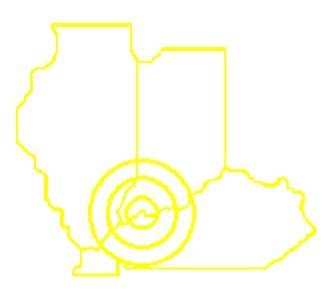(continued from Vanderburgh County, Indiana, in the Mexican War, page 4)
Smith, Vicissimees Teasley, Alfred Williams, Edmund Wyatt. Upon the monument also appears the inscription, “This monument was erected by the citizens of Vanderburgh county, Indiana, and the relations of the deceased.”
Captain William Walker was born in Delaware, September 10, 1782, and was a soldier in the war of 1812. He married and lived many years at Salem, New Jersey, whence he came to Evansville in 1835, with his family then consisting of his wife, Catherine, and five sons, James T., Dr. George B., Dr. John T, William H., Oscar, and two daughters, Mary, who married Richard Barker of Mt. Vernon, Indiana, and Hannah, who married Dr. William Welborn, and was the grandmother of the present Dr. James Y. Welborn of the Walker hospital. Captain Walker was variously engaged in business, such as excavating, street improving and house building in Evansville. He was an ardent Democrat, and was a court official when the war with Mexico came on. He was in his 64th year when he raised his company in Vanderburgh county.
Drs. George B. and John T Walker were early and prominent physicians and surgeons of Evansville. Dr. John T. Walker served in the Mexican war as assistant surgeon of the Second Indiana Volunteers and in the Civil war as surgeon of the Twenty-fifth Indiana Volunteer Infantry, and his son William H. Walker as adjutant of the latter regiment participated in the battle of Fort Donelson, afterward resigned on account of ill health, returned home and soon afterward suddenly died from the effects of camp life in the army service. Jesse W. Walker, another son of Dr. John T. Walker, served in the Civil war as major of the Twenty-fifth Indiana Volunteer Infantry, while in after years George B. Walker, also a son of Dr. John T Walker, rose to the rank of major in the United States regular army.
The late and distinguished physician and surgeon, Dr. Edwin Walker, one of the founders of Walker Hospital, was a son of James T. Walker, the eldest son of Captain William Walker. The present James T. Walker, for many years a ranking lawyer of Evansville, and Dr. Edwin Walker were brothers. William H. Walker, the fourth son of Captain Walker, was mayor of Evansville from 1868 to 1870, and died while an incumbent of this office.
Reverting to the battle of Buena Vista, we find that among the Americans wounded in that battle were Alason C. Ferres, George W. Knight, and Gordon Wilhoit. General Joseph Lane was wounded in the arm, but remained on the field in command until victory was won.
The regret[t]ed necessity arises for speaking of the action of the Second Indiana at the battle of Buena Vista, of which we would not have occasion to speak but for the fact that the Vanderburgh county company was a member of this regiment. An untimely retreat of the Second Indiana regiment threatened for a time the American army, and brought upon the regiment an undeserved stigma of disgrace. William W. Bowles, colonel of the regiment, it has always been believed, became panic stricken in the fierce battle and in cowardice ordered his regiment to retreat, to obey which order was but the military duty of the regiment. His order was a miserable piece of military bungling, and thereafter he was without influence in the service, and his regiment saw afterward no service by which they might have wiped out the disgrace it so much undeserved.
It may prove of interest to note here something of the after-life of Colonel Bowles. When his regiment was mustered out of the service he returned to his home in Orange county where he (continued next page)

